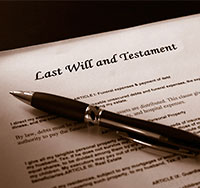Practice Pitfalls – Wills and Estates

In a previous issue of LAWPRO Magazine, we asked our claims counsel about what they feel are the biggest malpractice hazards in each area of law based on the claims files they work on every day. Here is an excerpt from that article urging lawyers to consider capacity when drafting a will. Click here to read the full article “Practice Pitfalls”. See also our wills & estates malpractice claims fact sheet for more pitfalls in this area.
We are seeing increased potential for claims surrounding issues of the capacity of elderly clients and undue influence.
The increased number of elderly clients with large estates also increases the risk that family disputes will entangle the lawyer.
If elderly clients come in requesting a major mortgage refinancing or change to their wills, it is important that lawyers not just take matters at face value. Dig below the surface to find out what’s going on. Be very wary of undue influence and ask “who’s benefiting from this arrangement?”
Don’t have the client in the same room as their son or daughter if they’ve all come to discuss changing the will or refinancing the family home for the children’s benefit. If there is a language barrier, don’t just rely on the “translation” of another family member. Have written proof that the advice was given regarding risks inherent in what the elderly clients are proposing or the need for
independent legal advice, and perhaps have the client provide a letter explaining his or her motives. Some lawyers now tape their meetings with clients in such situations (with client consent, of course). And finally, the lawyers must be aware of who they are acting for and avoid giving advice to parties with conflicting interests. All of this puts a burden on the lawyer, but as Goldberg says, “the reality of practice today is that you have to spend enormous amounts of time protecting yourself.”
Complicating things further is the question of capacity. When acting for elderly clients who want to make significant changes to their wills, lawyers have to be very careful about how they satisfy themselves that the clients have capacity and how evidence of that capacity is documented, because there’s a good chance that the will may be challenged and the lawyer will be drawn into the dispute.
Bernstein sees this as an issue of spotting the danger signs. “If you have clients who are in their late 80s, in a nursing home, with a substantial estate and numerous children, I see red flags. And if the new will distributes the estate in a dramatically different way so that some children get less than what they would have received under the old will, I see a will challenge on the horizon.” Having documentation that steps were taken to rule out undue influence and verify capacity could protect lawyers from costly claims.

Leave a Reply